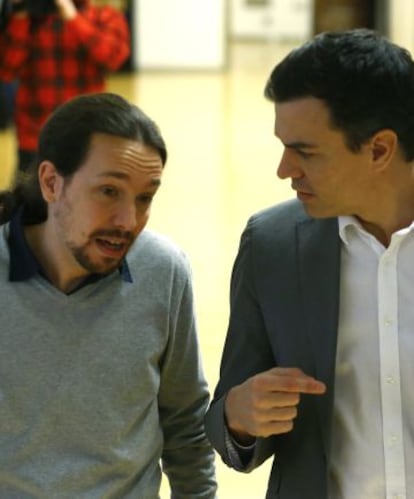Podemos and Socialist leaders agree to restart negotiations next week
But Pablo Iglesias and Pedro Sánchez refuse to back down on issues that have prevented a deal so far

Socialist leader Pedro Sánchez and Podemos chief Pablo Iglesias on Wednesday decided to renew their suspended relations and explore new possibilities for a deal that would pull Spain out of political limbo and avoid a new election.
Both leaders agreed to meet on March 30 to discuss ways out of the rut that Spanish politics has been stuck in since the inconclusive December 20 election.
The fragmented scenario that emerged from that vote has prevented any party from holding enough of a parliamentary majority to form a government.
Despite a flurry of cross-party talks between then and now, no coalition has emerged with enough seats to secure the required majority of 176 deputies.
The tone of Wednesday’s phone call, made by Sánchez to Iglesias, “was very cordial and expressed a complete willingness to open up a new framework for dialogue,” according to sources at both parties.
Political parties have until May 2 to reach a governing deal that will avoid the need for a fresh election
The conversation addressed “the need for an alternative to [acting Prime Minister Mariano] Rajoy and his policies” and both men agreed “on the need to open up a new political period.”
They also “talked about the necessary reforms in Spain, not just constitutional matters, but also on tax and labor market issues, and on democratic regeneration.”
This is not the first time that both parties have attempted to find common ground.
Prior to his failed bid to become prime minister in a congressional vote, Sánchez had already attempted to assemble a progressive coalition that would have included Podemos and other leftist forces.
Meanwhile, the anti-austerity party had also suggested a coalition in which Sánchez would be the prime minister and Iglesias his deputy. But Podemos’s specific demands for ministerial positions did not go down well in Socialist circles.
With relations in tatters, the Socialist Party turned instead to the other emerging party that performed well at the general election: Ciudadanos. Its leader Albert Rivera and Sánchez crafted a common “governing program” that addressed some of the country’s most pressing reforms, and urged other parties to join.

But Podemos has flatly refused to join any project that includes Ciudadanos. For now, however, Sánchez is unwilling to give up his association with Rivera.
Sánchez’s ideal situation would be an abstention by Podemos deputies that would allow him to become the next prime minister of Spain without breaking his deal with Ciudadanos. But Iglesias wants to be part of a coalition government that would leave the latter out.
Despite this stumbling block, both men on Wednesday expressed “mutual respect” for each other and said there was nothing preventing them from entering into dialogue.
Both also criticized “the style of a caretaker government that does not respect parliament,” a reference to the acting government’s refusal to submit to congressional oversight. On Wednesday, the Socialists, Podemos and Ciudadanos filed a joint motion asking the Constitutional Court to determine whether Congress can indeed monitor the actions of an acting government.
Political parties have until May 2 to reach a governing deal that will stave off a fresh election.
English version by Susana Urra.
Tu suscripción se está usando en otro dispositivo
¿Quieres añadir otro usuario a tu suscripción?
Si continúas leyendo en este dispositivo, no se podrá leer en el otro.
FlechaTu suscripción se está usando en otro dispositivo y solo puedes acceder a EL PAÍS desde un dispositivo a la vez.
Si quieres compartir tu cuenta, cambia tu suscripción a la modalidad Premium, así podrás añadir otro usuario. Cada uno accederá con su propia cuenta de email, lo que os permitirá personalizar vuestra experiencia en EL PAÍS.
¿Tienes una suscripción de empresa? Accede aquí para contratar más cuentas.
En el caso de no saber quién está usando tu cuenta, te recomendamos cambiar tu contraseña aquí.
Si decides continuar compartiendo tu cuenta, este mensaje se mostrará en tu dispositivo y en el de la otra persona que está usando tu cuenta de forma indefinida, afectando a tu experiencia de lectura. Puedes consultar aquí los términos y condiciones de la suscripción digital.








































